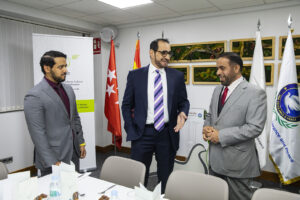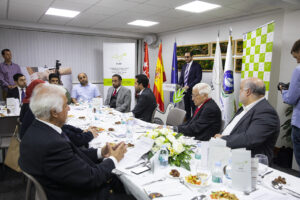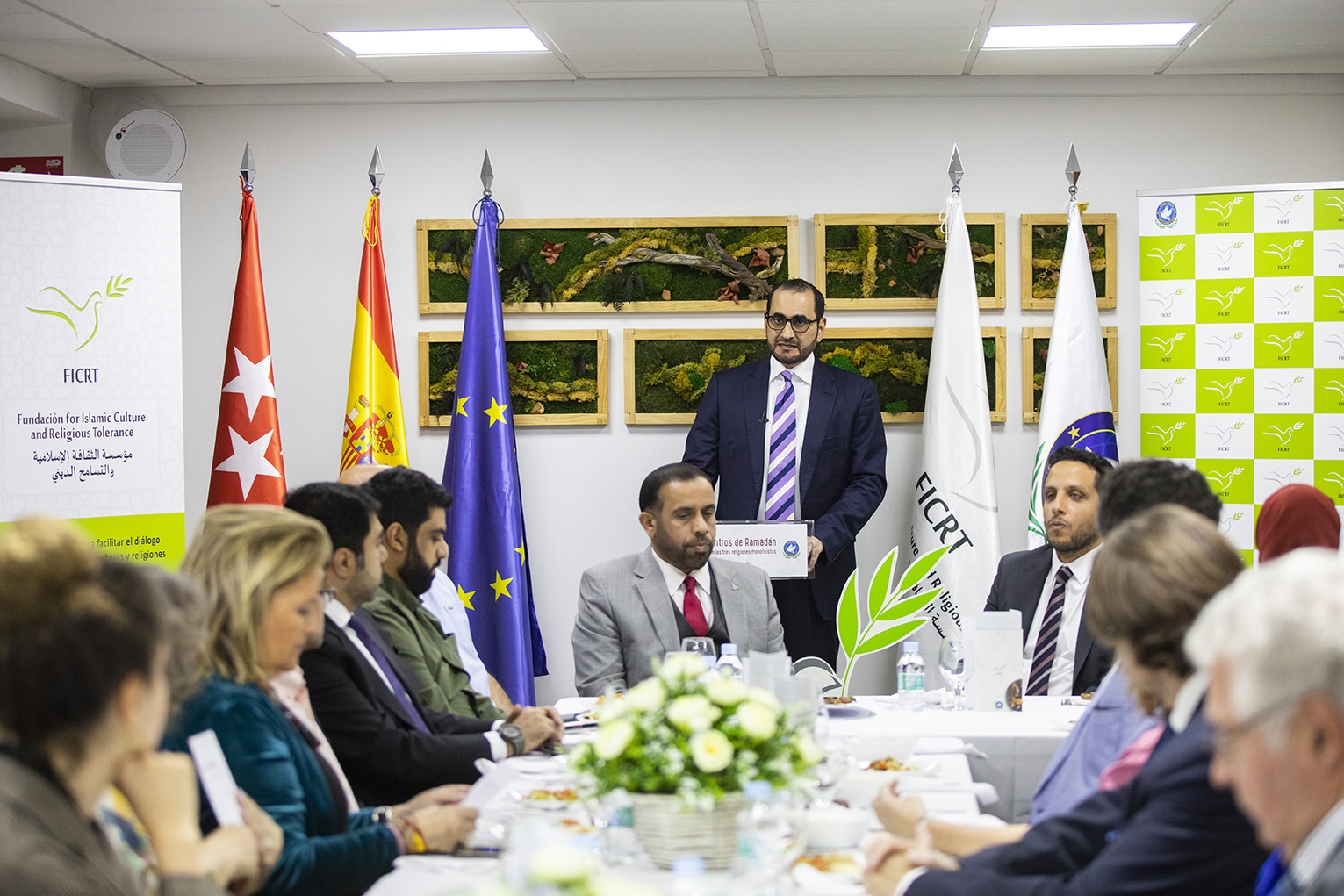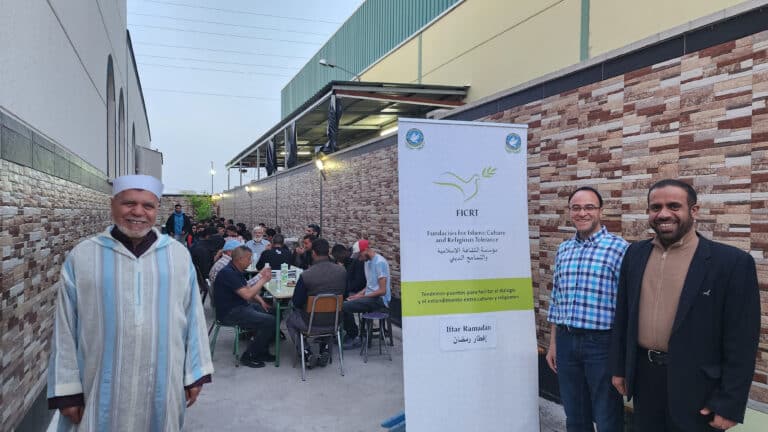As part of its social activities aimed at promoting collaboration with various state and religious institutions in Spain, the Fundación for Islamic Culture and Religious Tolerance (FICRT), has organized an Iftar (dinner to break the fast during the month of Ramadan) at its headquarters in Madrid on Monday, April 17, 2023, at the initiative of the president of FICRT and president of the Global Council for Tolerance and Peace (GCTP), H. E. Ahmad Bin Mohamed Al Jarwan, and the General Director of the Foundation, H. E. Musabeh Saeed Alketbi.
The meeting was attended by the Ambassador of the United Arab Emirates in Spain, H.E. Omar Obaid Al Shamsi; the founder and president of the NGO Mensajeros de la Paz, Father Ángel García Rodríguez; the Episcopal Delegate for Interfaith Relations of the Archdiocese of Madrid, Father Aitor de la Morena; the secretary of the Islamic Commission in Spain, H.E. Mohamed Ajana Elouafi; the President of the Spanish Federation of Associations and Clubs for UNESCO (FECU-UNESCO), Hon. Alberto Guerrero Fernández; the former deputy of the Spanish Congress of Deputies and current director of the International Chair ‘Women, Business and Sport’ of the Catholic University of Murcia, Excma. Mrs. María Jesús Bonilla; the president of the Intercultural Hispanic-Arab Circle (CIHAR), Hon. Abdo Tounsi; the general director of the Islamic Cultural Center of Leganés, Hon. Yaser Said Isa; and former Ambassador George Musad.

Also in attendance were several members of the diplomatic staff of the Embassy of the United Arab Emirates in Madrid, representatives of the European Forum for Peace: the Abraham Forum Association; EFCA-UNESCO as well as employees of the FICRT Foundation.
The director of FICRT, Hon. Musabeh Alketbi, opened the event, welcoming all attendees to the Iftar, and conveyed the greetings of the chairman of the foundation and the GCTP, H.E. Ahmad Bin Mohamed Al Jarwan. Alketbi stressed that FICRT despite being a young foundation, formed in 2017, has been able to make great strides in terms of organizing cultural activities aimed at promoting the values of tolerance and building bridges of communication and collaboration with academic and civil society institutions throughout Spain. These FICRT initiatives have materialized in the signing of several memorandums of understanding with universities and institutions that share the same objectives. FICRT also played a key role in providing humanitarian and health assistance during the Covid-19 pandemic, in collaboration with other organizations and institutions.
Alketbi has highlighted that, since the end of 2022, FICRT is already part of the group of institutions belonging to the Global Council for Tolerance and Peace (GCTP) abroad, an international non-governmental non-profit organization whose main task is to promote the values of peace and tolerance in different parts of the world.
“Within this new stage, the FICRT has recently signed a collaboration agreement with the Catholic University of Murcia for the creation of a new chair in which classes will be taught in the University Master’s Degree in Tolerance and World Peace Studies. This is the first joint initiative of the GCTP and FICRT in the academic field in Spain, taking into account that the GCTP -whose members are currently more than 100 people- has signed more than 30 memorandums of understanding with different universities around the world”, said Alketbi.
The general director of FICRT emphasized that FICRT’s annual plan also includes activities and objectives within the fields of culture and religious tolerance.
“We are pleased to announce the establishment of an academic center in Granada for the promotion of interculturalism and tolerance in society. Our main objectives also include collaborating and communicating with everyone, regardless of religion, nationality, race or color,” added Alketbi.

For his part, the Ambassador of the United Arab Emirates in Spain, H. E. Omar Obaid Al Shamsi, expressed his gratitude to FICRT for the invitation to participate in this Ramadan Iftar event.
The head of the Emirati diplomatic mission in Spain stressed that this meeting, which coincides with a holy month in Islam, undoubtedly reaffirms the importance of reinforcing the values of tolerance, mutual respect and coexistence. He stressed that these values are fundamental to building tolerant and united societies, and to fostering unity and social solidarity among all, regardless of color, culture or religion, in order to build, expand and strengthen the bridges of fruitful human relations.
“The UAE is home to more than 200 foreign nationalities living together in peace, harmony and mutual respect, which reflects the country’s strong commitment to tolerance as a fundamental value of society, and highlights that cultural and religious differences could be a source of richness and cooperation in building a better society,” Al Shamsi stressed.
The Emirati ambassador stressed that he still remembers the historic visit of His Holiness Pope Francis to the UAE in February 2019, and stressed that it was one of the most important events that the country has carried out in terms of spreading the culture of tolerance and peaceful coexistence, and that it has promoted numerous initiatives that have placed the UAE at the forefront of countries in this field, to the point of being recognized internationally as the “World Capital of Tolerance”.
“One of the major achievements of this historic visit was the signing by His Holiness Pope Francis and the Grand Imam of Al-Azhar, Sheikh Ahmed Al-Tayeb, of the Document on Human Brotherhood for World Peace and Common Coexistence, under the patronage of His Highness Sheikh Mohammed bin Zayed Al Nahyan, President of the UAE, which changed the map of coexistence and peace in the world through many initiatives, most notably the Abrahamic Family House project in Abu Dhabi, which symbolizes unity and human brotherhood, and the Abraham Agreement, which marked a crucial historic moment in laying the foundations for peace and stability after decades of conflicts and tensions,” Ambassador Obaid Al Shamsi added.
In this sense, the president of the NGO Mensajeros de la Paz, Father Angel, stressed the importance of using the Document of Human Fraternity, signed in the UAE, to continue supporting understanding, rapprochement and interreligious dialogue; also reinforcing the values of coexistence, tolerance and peace, these values being the only way to maintain respect for diversity and plurality, which enrich societies and help them to achieve prosperity and sustainable development, especially in times of crisis and adversity.
For his part, the Episcopal Delegate for Interconfessional Relations of the Archdiocese of Madrid, Father Aitor de la Morena, defended that diversity is the pillar from which the common things that unite human beings, that is, cordiality, mercy and fraternity, will have to start. He stressed that these values contribute to the promotion of dialogue, tolerance and coexistence in societies facing the same challenges.
The Secretary of the Islamic Commission in Spain, H.E. Mohamed Ajana, stressed that the Islamic religion defends in several positions and verses of the Koran the idea that God has created human beings in the form of different peoples and tribes in order to encourage us to know and understand each other. “It is the divine wisdom that drives human beings to promote the values of brotherhood and tolerance and encourages them to explore those opportunities that contribute to the strengthening of dialogue and coexistence, for the benefit of the whole world,” said Ajana.







